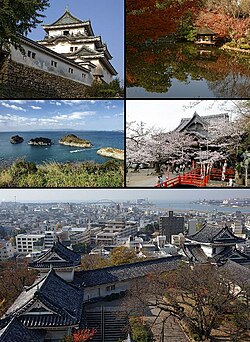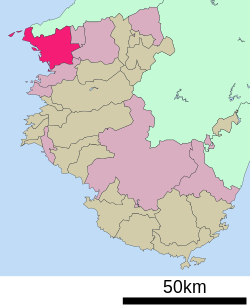Wakayama, Wakayama
|
Wakayama City 和歌山市 |
||
|---|---|---|
| Core city | ||

Wakayama Castle, Nishinomaru Garden, Saikazaki, Kimiidera Temple, Downtown Wakayama viewed from the castle keep
|
||
|
||
 Location of Wakayama City in Wakayama Prefecture |
||
| Location in Japan | ||
| Coordinates: 34°14′N 135°10′E / 34.233°N 135.167°ECoordinates: 34°14′N 135°10′E / 34.233°N 135.167°E | ||
| Country | Japan | |
| Region | Kansai | |
| Prefecture | Wakayama Prefecture | |
| Government | ||
| • Mayor | Kenichi Ohashi (since August 2002) | |
| Area | ||
| • Total | 210.25 km2 (81.18 sq mi) | |
| Population (October 1, 2010) | ||
| • Total | 369,088 | |
| • Density | 1,755.47/km2 (4,546.6/sq mi) | |
| Symbols | ||
| • Tree | Cinnamomum camphora | |
| • Flower | Azalea | |
| Time zone | Japan Standard Time (UTC+9) | |
| City hall address | Nanabancho 23, Wakayama City, Wakayama Prefecture (和歌山県和歌山市七番丁23番) 640-8511 |
|
| Website | www |
|
Wakayama City (和歌山市 Wakayama-shi?) is the capital city of Wakayama Prefecture in the Kansai region of Japan.
Wakayama City occupies 4% of the land area and has 40% of Wakayama Prefecture's population. The city was founded on April 1, 1889. It is on the northern edge of Wakayama Prefecture, bordering Osaka Prefecture. Southern Wakayama Prefecture is largely rural.
The city population rose from 382,155 in 2003 to 386,501 in 2004, a growth of 1.87%. The population density as of October 1, 2010, was 1,755.47 persons per km². The total area is 209.20 km².
This population increase has occurred despite Wakayama's beleaguered economy, which has suffered since Sumitomo Steel moved much of its steel producing operations to China. The Wakayama steel mills have since been reduced and restructured, with part of the industry completely shutting in 2004.
Wakayama is cleft in two by the Kinokawa River. The city is bordered at the north by mountains and Osaka Prefecture.
In the city center is Wakayama Castle, built on Mt. Torafusu (the name means "a tiger leaning on his side") in a city central park. During the Edo period, the Kishū Tokugawa daimyo ruled from Wakayama Castle. Tokugawa Yoshimune, the fifth Kishū Tokugawa daimyo, became the eighth Tokugawa shogun. This castle is a concrete replica of the original, which was destroyed in World War II.
...
Wikipedia


